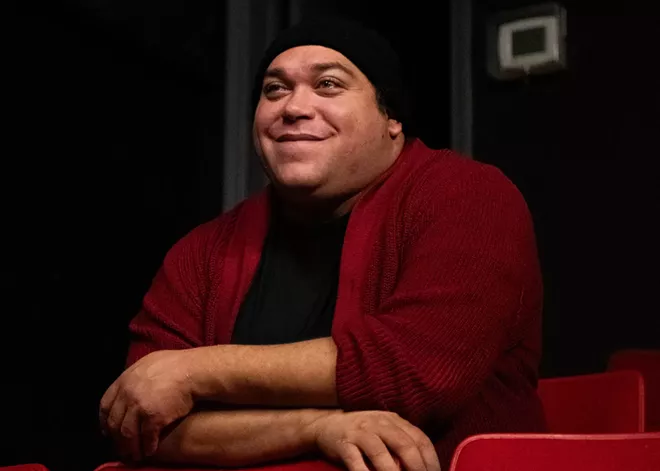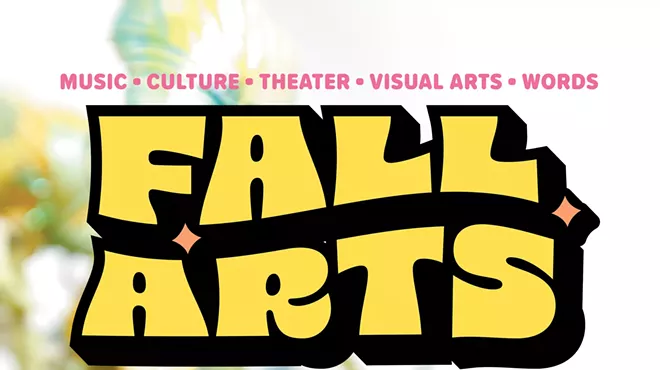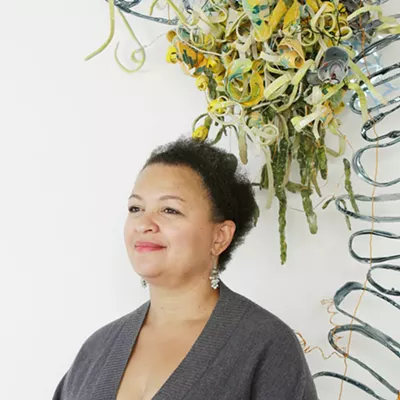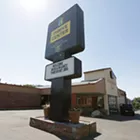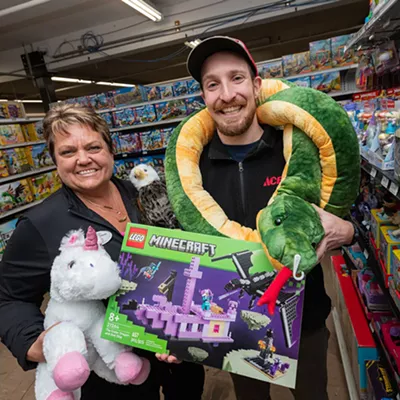Had events unfolded differently for Dahveed Bullis, he might be making a living on the music circuit. At one time his band Arcadia Is Burning had regular gigs at venues throughout Spokane.
"Back in the day, we played all over the place," he says. "We played the Knitting Factory a couple times. We played the Cretin Hop, the Hop. All these cool little spots that aren't really operating anymore. The Empyrean, the Boulevard, the Seaside."
But once the band reached a certain threshold of success, they were faced with the tough choice of committing to touring or definitively calling it quits. Bullis suggests that Arcadia Is Burning sealed its fate by never really deciding either way.
"We just kind of slowly dissolved."
Before long, however, theater — the medium for which he's best known today — started to supplant music as Bullis' primary creative outlet. He acted in and directed a lengthy list of stage productions at theaters throughout the region. He helped establish the Spokane Theatre Arts Council, an organization that advocates for more equity in the theater community. In 2014, he returned to his alma mater, West Valley High School, for a stint as an assistant theater director.
In the fullness of time, and despite some steep personal challenges, Bullis would graduate from Eastern Washington University's Theatre Arts Program. He also came to lead the theater program at Company Ballet School in Spokane Valley. And in 2020, along with Scott Doughty, he founded Spokane Playwrights Laboratory, a nonprofit dedicated to fostering regional writing talent by workshopping scripts and connecting writers with industry resources. SPL has helped emerging local playwrights like Tristen Canfield turn their dramatic concepts into full-fledged productions.
For a theater career that already had its share of milestones, 2022 marked the start of a supercharged phase when Bullis appeared alongside Matt Slater and Danny Anderson in a production of Pass Over, Antoinette Nwandu's absurdist existential drama, at Stage Left Theater.
The show, which was directed by Malcolm Pelles, ended up going to the American Association of Community Theatre's biennial AACTFest and competing at the national level. There it picked up multiple sought-after awards, including one for Overall Outstanding Production. On top of that, Bullis won the monologue competition with a separate piece.
The success of Pass Over has been a turning point of sorts for Bullis, who's been able to take the play on tour with the same cast members. He just recently returned from a weekend in Bellingham, where New Prospect Theatre hosted their production and an audience talkback session.
"It's so rare that you work on a play beyond a run, and we've been working on Pass Over for a year and a half now. It's exciting. We're really wanting to get into schools, colleges, just to bring it out to people. This is the type of show that really needs to be seen, and it hits the subjects that need to be talked about," he says.
MINIMUM WAGE
Oct. 6-22, Thu-Sat at 7 pm, Sun at 2 pm, $25
Stage Left Theater, 108 W. Third Ave.
stagelefttheater.org, 509-838-9727
At the same time as he's touring with Pass Over, Bullis is preparing to direct the debut run of Minimum Wage, a play that he himself wrote and workshopped with SPL. When it opens at Stage Left on Oct. 6, it will be the culmination of eight years of ruminations, notes, drafts and revisions. The play is based on Bullis' own experience as a manager in a fast food restaurant.
The protagonist is "a store fixer, and there's a lot of pressure on him. He's also a single father and an aspiring actor. So there's this Tennessee Williams play, and he brings it up all throughout the show, but he doesn't have time to practice," Bullis says. "And throughout the process of [Minimum Wage], we get to see all of the other characters get put in situations where they're making impossible choices."
There are universal touchstones there, then, but Bullis deliberately situated his play in Spokane.
"It's my love letter to my people. Spokane needs to hear stories about Spokane written by Spokanites. I'm tired of going to a theater and seeing New York's story or Chicago's story or a random town in Ohio's story. You come and watch Minimum Wage, you're going to hear characters say, 'Sprague.' You're going to hear characters say, 'Rosauers.' We're talking about our city," he says.
Another rationale for the specific setting was to drive home the immediacy of his characters' lives.
"This story's happening right now. These are real situations that really happened in your city — and to people that most of the time you don't want to think about unless they mess up your order."
And yet, as immersed as he is in theater work right now, Bullis hasn't abandoned music altogether. He recently had a solo performance at Brick West Brewing Co., and other small gigs are scheduled for the autumn. Last year he was also invited to work with musician and songwriter Olivia Brownlee on her Spokane tribute album This Is Where You Live.
His involvement in that project, he says, was as gratifying as it was apt.
"Being a Spokanite my entire life, and being a part of an album that's all about Spokane, that's my entire m.o. as an artist." ♦

